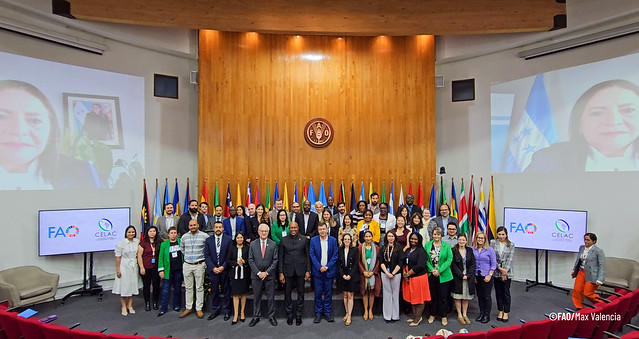Technical meeting Social protection systems and food security and nutriton implementation challenges in the context of the CELAC FSN Plan 2030
Hybrid Event, 09/11/2023 - 10/11/2023
Context and background
Food security and nutrition situation
The State of Food Security and Nutrition in the World 2023 (FAO et al., 2023) indicates that in Latin America and the Caribbean the prevalence of undernourishment has slightly decreased, while globally and in other regions there is a concerning increasing trend.
However, in Latin America and the Caribbean significant differences still exist between subregions. In the Caribbean, the prevalence of moderate or severe food insecurity increased, and the regional estimation for Latin America and the Caribbean is higher than the global average. This situation poses significant challenges for fulfilling the commitments of the Sustainable Development Goals (SDGs) by 2030.
In 2022, 247.8 million people in the region were in a condition of moderate or severe food insecurity. It is worth nothing that, despite a reduction in the gender gap, food insecurity remains more prevalent among women than men, affecting 41.8 percent of adult women in the region, which represents a gap of 9.1 percentage points.
In 2022, moderate or severe food insecurity affected 40.4 percent of adults living in rural areas, compared to 38.6 percent in peri-urban areas and 32.1 percent in urban areas of the region. Therefore, it is essential to address and reduce the inequalities, particularly those affecting women, populations in rural areas, Afro descendants, and indigenous peoples.
Regarding malnutrition in all its forms, in 2022, it was reported that stunting affected 5.7 million children under five years of age in the region (11.5 percent), and it is especially frequent among children whose mothers have not received formal education and who belong to the lowest income 2 quintile. The prevalence of overweight affects 4.2 million children under five years of age (8.6 percent), equivalent to 3 percentage points above the global prevalence. Evidence from 2016 also show that 106 million adults lived with obesity (approximately 24.2 percent of the adult population in the region), and it is more prevalent among women, with a gender gap of at least 10 percentage points.
Malnutrition levels could be associated with the high cost of healthy diets in Latin America and the Caribbean, which was equivalent to USD 4.08 PPP per person per day in 2021 (the highest in the world). Moreover, in the same year, 133.4 million people (22.7 percent of the region’s population) were unable to afford a healthy diet.
CELAC FSN Plan
La VII Summit of the Community of Latin America and Caribbean States (CELAC) concluded with the Declaration of Buenos Aires (24 January, 2023). In this Declaration, CELAC’s 33 Member States reaffirm their commitment to food security, agriculture, and sustainable development. The Declaration also emphasized the commitment to promote a fairer, more transparent, equitable and predictable international trade system. Also, it highlights the importance of updating the CELAC Plan for Food security and nutrition and the Eradication of Hunger 2025 (CELAC FSN Plan 2025), "considering the new international context and the challenges facing our region". To achieve this technical assistance from global organizations like the FAO and regional bodies such as ECLAC, IICA, ALADI was requested.
In 2023, Saint Vincent and the Grenadines assumed the Pro Tempore Presidency (PPT) of CELAC and, in accordance with the mandate established in the Declaration, began the preparation of a technical proposal for updating the CELAC FSN Plan. The update considers the national commitments related to the 2030 Agenda for Sustainable Development, evidence-based policies and good practices in the region, considering social protection systems as a potential mechanism for eradicating poverty, hunger, food insecurity, and malnutrition.
Nutrition-sensitive social protection
Social protection encompasses a set of policies and programmes aimed at safeguarding individuals in situations of poverty and vulnerability throughout their life cycle. These programmes aim to facilitate greater access to resources (cash), goods (such as food and seeds) and services. By incorporating a nutrition-sensitive approach, social protection measures can further impact the four dimensions of food security (access, availability, stability, and utilization), improve access to and affordability of healthy diets for vulnerable populations, and address the immediate, underlying socio-economic causes of hunger and malnutrition in all its forms (FAO, 2017).
Social protection measures, such as cash and in-kind transfers, can have a positive impact on food security and nutrition by increasing the number of daily meals, diversifying diets, and reducing the negative consequences of malnutrition. However, social protection alone is not sufficient to achieve sustainable improvements in nutrition. Social protection needs to be linked to other inclusive policies across agri-food systems, such as in agriculture, health, nutrition, education, water, and sanitation. A clear example in that regard is school feeding programmes, which can link school meals with local markets and support culturally relevant healthy diets.
Objectives
General objectives
- Conduct consultations with policy makers and technical personnel from CELAC member states, experts from international agencies, parliamentarians, regional institutions, academia, and civil society, among others, regarding the pillars and lines of action of the CELAC FSN Plan 2024-2030.
- - Provide a plataform for exchanging experiences, evidence, and good prac3ces of policies, plans and programmes, which are part of the social protection systems.
Specific objectives
- Conduct consultations with policy makers and technical personnel from CELAC member states, experts from international agencies, parliamentarians, regional institutions, academia, and civil society, among others, regarding the pillars and lines of action of the CELAC FSN Plan 2024-2030.
- Facilitate the exchange of knowledge and learning on nutrition-sensitive social protection approach. This includes discussing the pillars and lines of action of the CELAC FSN Plan regarding social protection to promote integrated approaches, including those related to rural development, economic inclusion, gender equality and climate change adaptation, among others, in order to advance towards a sustainable development.

